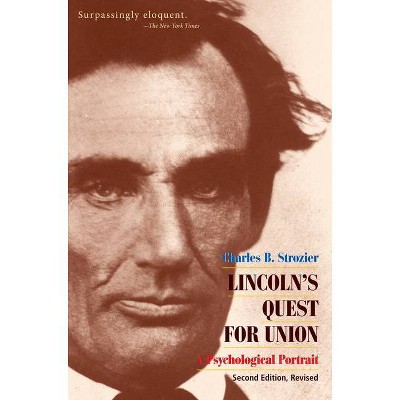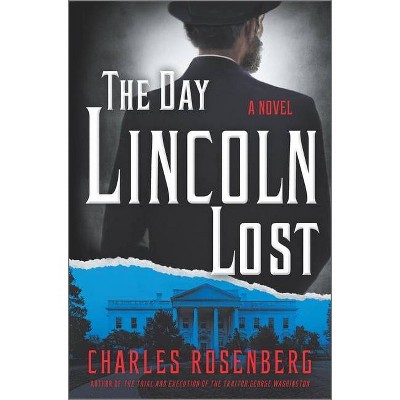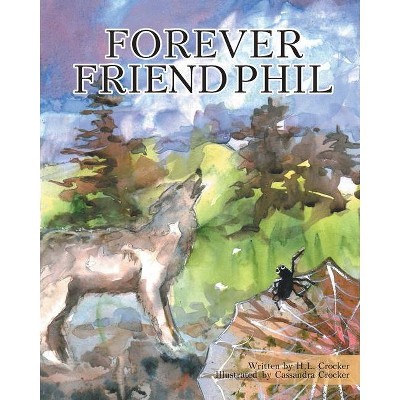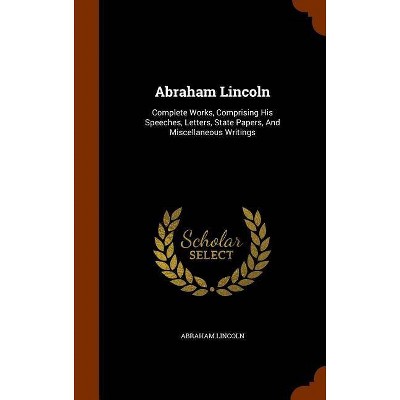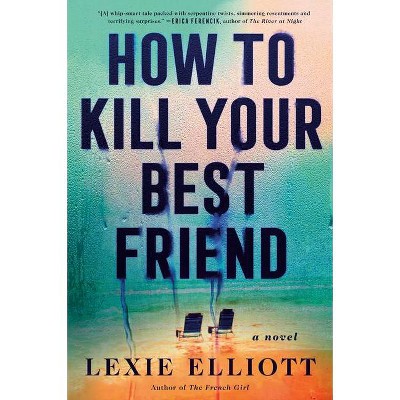Your Friend Forever, A. Lincoln - by Charles Strozier (Hardcover)
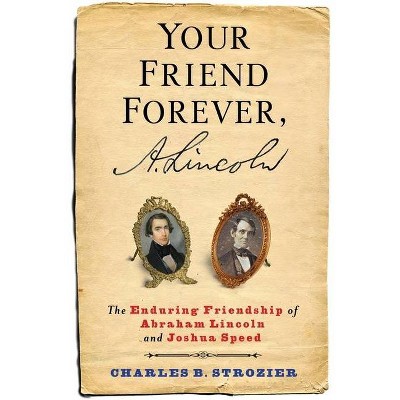
Similar Products
Products of same category from the store
AllProduct info
<p/><br></br><p><b> About the Book </b></p></br></br><i>Your Friend Forever, A. Lincoln</i> is a rich analysis of one of the most important friendships in American history. Joshua Speed and Abraham Lincoln's relationship was both a model of male friendship and a specific dynamic between two brilliant but fascinatingly flawed men. Their friendship resolves important questions about Lincoln's early years.<p/><br></br><p><b> Book Synopsis </b></p></br></br>On April 15, 1837, a "long, gawky" Abraham Lincoln walked into Joshua Speed's dry-goods store in Springfield, Illinois, and asked what it would cost to buy the materials for a bed. Speed said seventeen dollars, which Lincoln didn't have. He asked for a loan to cover that amount until Christmas. Speed was taken with his visitor, but, as he said later, "I never saw so gloomy and melancholy a face." Speed suggested Lincoln stay with him in a room over his store for free and share his large double bed. What began would become one of the most important friendships in American history. <p/>Speed was Lincoln's closest confidant, offering him invaluable support after the death of his first love, Ann Rutledge, and during his rocky courtship of Mary Todd. Lincoln needed Speed for guidance, support, and empathy. <i>Your Friend Forever, A. Lincoln</i> is a rich analysis of a relationship that was both a model of male friendship and a specific dynamic between two brilliant but fascinatingly flawed men who played off each other's strengths and weaknesses to launch themselves in love and life. Their friendship resolves important questions about Lincoln's early years and adds significant psychological depth to our understanding of our sixteenth president.<p/><br></br><p><b> Review Quotes </b></p></br></br><br>[A] well-thought-out psychohistorical case study.--Choice<br><br>An enjoyable look at a man on the 'edge of politics' who had a strong influence on Lincoln's development.--Kirkus Review<br><br>Anyone wanting to know more about the elusive private Lincoln will need to read this book.--Library Journal<br><br>Given his psychoanalytic expertise, Strozier's high quality psychohistorical work helps illuminate important emotional events that other biographers and historians have left in the shadows.--Psychohistory News<br><br>Original, perceptive, and persuasive.--Wall Street Journal<br><br>Strozier's book on the friendship of Lincoln and Speed is a valuable contribution to the voluminous literature on the 16th President and virtually a casebook of superb psychobiographical writing.--Journal of Psychohistory<br><br>This is a useful, timely, and thought-provoking book for Lincoln scholars and general readers. Strozier is to be commended for producing it.--Civil War Book Review<br><br>[A] brisk, fluent examination of Lincoln's profound and psychologically consequential friendship with Speed.--J. Michael Lennon "Illinois Times "<br><br>Lincoln was the hub of an important wheel of political and social life, and Strozier has repaired the missing spoke that is Joshua Speed. He has done so in part by reconnecting Speed to Lincoln's other friends and acquaintances, to provide as full a picture of these young American men's interior lives as we are likely to get. His use of often-ignored archival sources is brilliant.--James M. Cornelius, Lincoln curator, Abraham Lincoln Presidential Library and Museum<br><br>Bringing the twin skills of a professional historian and trained psychoanalyst, Strozier has beautifully illuminated the real significance of the relationship between Joshua Speed and Abraham Lincoln in a crucial formative period in each of their lives. He has shown that their intense relationship was an essential part of both of their developments as mature, heterosexual males. In the process of the unfolding understanding of their bond, Strozier also has given us a new and deeper insight into the cause of Lincoln's depression and his vacillating courtship of Mary Todd. We also learn about the nature of male bonding in 19th century America. This is a must-read for anyone who is interested in and wants a nuanced understanding of one of the most important figures in American history.--David M. Terman, M.D., former director of the Chicago Institute for Psychoanalysis<br><br>Charles B. Stozier long ago established himself as a pioneering student of Lincoln's inner life. He now returns to the field with the first comprehensive study of Lincoln's close friendship with Joshua Speed. If history is any guide, Strozier's compelling account of this crucial aspect of the Lincoln biography is sure to become definitive.--James Oakes, Distinguished Professor of History, Graduate Center, City University of New York<br><br>Charles Strozier is unique in his combination of psychological and historical imagination. This highly original book tells us a great deal about Lincoln himself, about the nature of friendship, and about the surprising ways in which friendship can contribute to greatness.--Robert Jay Lifton, author, <i>Witness to an Extreme Century: A Memoir</i><br><br>Few people played as large a role as Joshua Speed did in helping Abraham Lincoln become Abraham Lincoln. American history was shaped nearly 180 years ago when the tall, thin, ambitious but uncertain 28-year-old walked into Speed's store and struck up a conversation.--Patrick T. Reardon "Chicago Tribune "<br><br>In this compact and fluent study of Lincoln's anguished inner life in the five years preceding his 1842 marriage, Strozier anatomizes his intense, complex and therapeutic relationship with his closest friend, Joshua Speed. Drawing on a huge range of previously scattered sources (as well as current psychological notions of mutuality and empathy), he meticulously recreates the mirrored crises both men underwent as they lurched into the desired but dreaded realm of marriage and sexual intimacy. It will stand as the definitive account of this critical period in Lincoln's life.--Cullom Davis, former director, Lincoln Legal Papers, and emeritus professor of history, University of Illinois-Springfield<br><br>No one has previously succeeded in re-creating the nuances of the Lincoln-Speed friendship as deeply or seriously as Prof. Strozier. Moreover, I think it would be safe to say that Strozier is uniquely situated within the Lincoln scholarly fraternity to write on precisely this subject.--Allen Guelzo, Gettysburg College, author of <i>Gettysburg: The Last Invasion</i><br><br>Strozier brings a shrewd psychoanalyist's insight to this vivid chronicle of perhaps the closest and most consequential friendship of Abraham Lincoln's life.--Geoffrey C. Ward, author of <i>A First-Class Temperment: The Emergence of Franklin Roosevelt</i><br><br>Strozier is a masterful psychobiographer, one who manages to combine diligent research into archival materials and other types of primary sources with a creative and often inspired approach to the close reading of documents. That is a rare combination.--Matthew Pinsker, Dickinson College, author of <i>Lincoln's Sanctuary: Abraham Lincoln and the Soldiers' Home</i><br><br>The men's frank exchanges about their anxieties proved therapeutic, Strozier compellingly argues, enabling both men to ultimately take the plunge into marriage and become, for lack of a better phrase, grown-ups.--Ronald K. Fried "Daily Beast "<br><p/><br></br><p><b> About the Author </b></p></br></br>Charles B. Strozier, a historian and psychoanalyst, is a professor of history at John Jay College and the Graduate Center, CUNY, and faculty, training, and supervising analyst at TRISP in New York City. His books include <i>Lincoln's Quest for Union: Public and Private Meanings</i> (1982) and <i>Until the Fires Stopped Burning: 9/11 and New York City in the Words and Experiences of Survivors and Witnesses</i> (2011).
Price History
Price Archive shows prices from various stores, lets you see history and find the cheapest. There is no actual sale on the website. For all support, inquiry and suggestion messagescommunication@pricearchive.us
